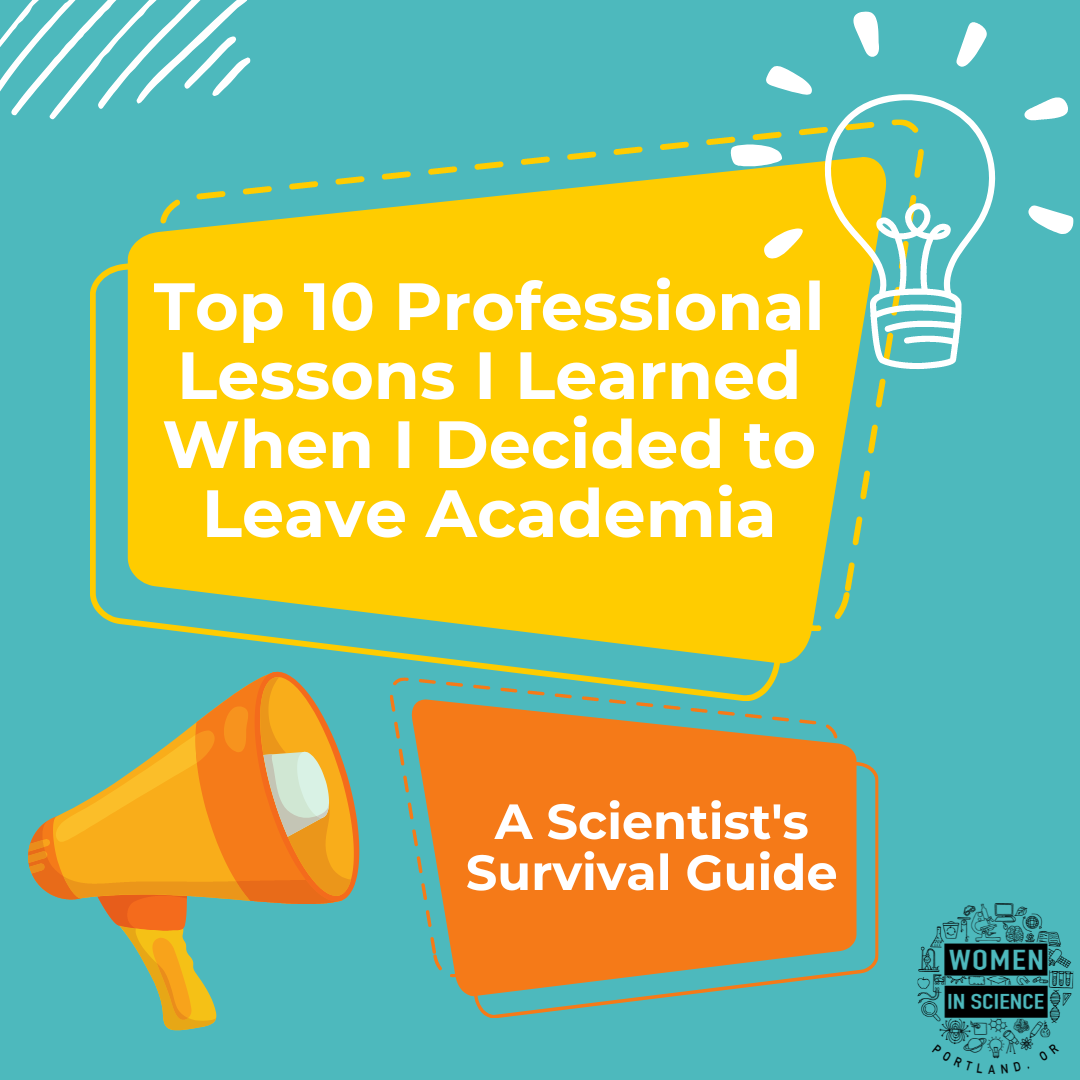Top 10 Professional Lessons I Learned When I Decided to Leave Academia
Graduate students and postdocs are often taught that leaving academia for an ‘alternate career’ in industry puts you in the minority of STEM profressionals. But the myth of non-academic careers as ‘alternative’ is no more. In reality only 30% of STEM graduates stay in academia. More and more, STEM graduates choose industry careers in pursuit of better work conditions and greater real-world impact.
Despite this norm, without proper career training the job search can be overwhelming. Graduates are often left wondering:
What options are there for scientists outside of academia? How do I translate my CV to a resume? How do I communicate my value as a scientist to people outside of academia?
Fortunately, after I decided to leave academia I spent 8 months conducting in-depth research to answer these questions and more. I spoke with 65 STEM professionals from diverse backgrounds (BS, MA, MS, MPH, MBA, PhD) and careers who have successfully navigated the transition from academia to industry. While each professional had a unique career journey, much of their advice overlapped and is now the foundation for my own professional development.
I’m happy to share the top 10 professional lessons I learned about beginning your transition from academia to industry.
There are A LOT of jobs that you can do with a degree in STEM!
For a list of STEM career options, click here.There is no additional benefit to staying in academia once you’ve decided to leave
Every professional I interviewed unanimously agreed with this point. That’s because a STEM degree equips you with a valuable toolkit of transferrable skills that easily translate to success in non-academic careers. Additionally, staying in academia after it no longer serves your professional goals not only prolongs your career transition, it also hurts you financially in the long-run.
Tip: The most valuable experience you’ll gain will come from working in industry. Instead of diversifying your skills in academia, focus on diversifying your experiences outside of academia.There’ll never be a good time for you to leave the lab, according to your boss
There will always be data to analyze, projects to complete, and papers to publish. But skills can be learned and replacements can be found.Don’t pigeonhole yourself
Academics like to define themselves by their research topic, but industry is much less niche. Diversify your expertise to increase your marketability in industry.Get a non-academic email account
Having an email that doesn’t end in .edu can help you fight the stereotype of scientists as lifelong academics and organize your communication with potential employers separate from your work emails.Convert your Curriculum Vitae to a 1-2 page resume
Learn to convert your CV to a resume here.
Tip: Ask industry professionals in your field for feedback about formatting, skills to highlight, etc.Make a LinkedIn profile
LinkedIn is the world’s largest professional networking site with 810+ million professionals from every industry worldwide. If you don’t have a LinkedIn account you’re missing out on valuable networking and career opportunities.Tailor your LinkedIn profile towards the role(s) you want
LinkedIn offers a dynamic medium to present your accomplishments and tell a broader story about who you are as a professional. Take advantage of the online learning opportunities, content creation features, and flexible format to demonstrate how your key skills and accomplishments contribute to your professional brand and value as a STEM professional. Click here to learn how to tailor your LinkedIn profile for your dream role.Networking is key!
85% of jobs are filled through networking and 70% of jobs are never publicly posted. So who you know matters! For networking tips, click here.Searching for a job is a full time job
Take your time. Focus on the quality vs quantity of applications and connections. Take breaks when necessary.
About the author:
Natasha Fowler, Ph.D. (she/her) is an interdisciplinary clinical scientist who’s passionate about overseeing projects and programs that make science and healthcare more diverse, equitable, and inclusive and applying this knowledge to improve prevention, diagnostic, and treatment strategies. She’s also an advocate for scientists interested in non-academic careers. As the Communications Committee Chair of WIS and a volunteer on the WIS Professional Development Committee, Natasha loves connecting people with other people and with information that can aid in their career journey. Outside of work, Natasha is an avid traveler who loves connecting with others through food, different languages, and comedy.



